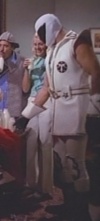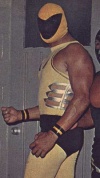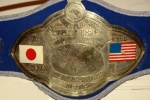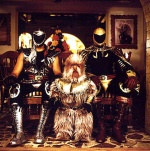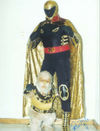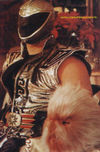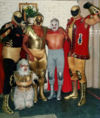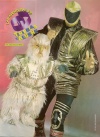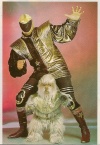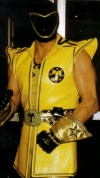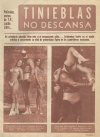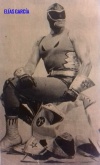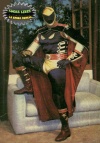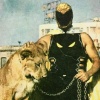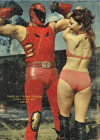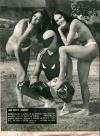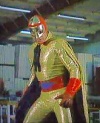Tinieblas: Difference between revisions
I Like Lucha (talk | contribs) |
|||
| Line 22: | Line 22: | ||
<font face="Verdana"> | <font face="Verdana"> | ||
inieblas was born on June 8, 1939 (not 1945 like he'll tell you) in Mexico City. Even though his family name shouldn't be revealed at this point, he's the brother of a famous Mexican bullfighter of the past. | |||
From the 60s to the early 90s, there was a very popular magazine in Mexico called "Lucha Libre", run by Valente Pérez (though it was renamed "Lucha Libre Mundial" when Benjamín Mora Jr. took over, and not coincidentially, the magazine didn't last a lot with Mora in charge). LL also had a bodybuilding sister magazine called "Muscle Power", whose editor also was Valente Pérez. Pérez, who was well liked and respected in the business and had a very good relationship with the Lutteroth family, had a special talent to come up with names and personalities for new luchadores, the most successful one being Mil Máscaras. | From the 60s to the early 90s, there was a very popular magazine in Mexico called "Lucha Libre", run by Valente Pérez (though it was renamed "Lucha Libre Mundial" when Benjamín Mora Jr. took over, and not coincidentially, the magazine didn't last a lot with Mora in charge). LL also had a bodybuilding sister magazine called "Muscle Power", whose editor also was Valente Pérez. Pérez, who was well liked and respected in the business and had a very good relationship with the Lutteroth family, had a special talent to come up with names and personalities for new luchadores, the most successful one being Mil Máscaras. | ||
At the same time, a young man who had entered "Mister Jalisco" contests in Guadalajara, was scouted by Black Shadow and Dory Dixon. Both saw a future star in the youngster, especially because he was very tall for a Mexican. Shadow and Dixon convinced him to get into pro wrestling and he went under training with EMLL's maestros Rafael Salamanca and Dick Medrano. | At the same time, a young man who had entered "Mister Jalisco" contests in Guadalajara, was scouted by [[Black Shadow]] and [[Dory Dixon]]. Both saw a future star in the youngster, especially because he was very tall for a Mexican. Shadow and Dixon convinced him to get into pro wrestling and he went under training with EMLL's maestros Rafael Salamanca and Dick Medrano. | ||
Before wrestler, he was an actor and extra, participating in films with capulina, [[El Santo | Santo]] and [[Blue Demon | Blue Demon]] in movies such as Frankenstein, ''Satanas'' and was one of the mummy's in Las Momias de Guanajuato. He made his debut as Tinieblas in the movie Los Campeones Justicieros (1970. A year later made his debut as luchador. He also participated in these films: | |||
#[[1982 El puño de la muerte]] as Tinieblas | #[[1982 El puño de la muerte]] as Tinieblas | ||
| Line 45: | Line 46: | ||
#1963 [[Kings of the Sun]] (uncredited) . | #1963 [[Kings of the Sun]] (uncredited) . | ||
Also filmed Las Aventuras de Capulina with | Also, he filmed Las Aventuras de Capulina with [[Alushe]] in the 70s and 80s. | ||
In 1968, Pérez came up with a new character that had money written all over it. He thought about an ultimate heel nemesis for Mil Mascaras, and what better for that than the subject of darkness? He had even designed the perfect mask for this wrestler - a faceless hood. That's how Tinieblas was born, but in the end, he made his debut (and spent the rest of his career) as a tecnico and not as a rudo. In his first match, he teamed with Dixon and Shadow to face Dr. Wagner, El Solitario and Renato Torres in the main event of the August 20, 1971 Arena Mexico card. | In 1968, Pérez came up with a new character that had money written all over it. He thought about an ultimate heel nemesis for Mil Mascaras, and what better for that than the subject of darkness? He had even designed the perfect mask for this wrestler - a faceless hood. That's how Tinieblas was born, but in the end, he made his debut (and spent the rest of his career) as a tecnico and not as a rudo. In his first match, he teamed with [[Dory Dixon]] and [[Black Shadow]] to face [[Dr. Wagner]], [[El Solitario]] and [[Renato Torres]] in the main event of the August 20, 1971 Arena Mexico card. | ||
In a way, Tinieblas can be seen as a disappointment, because even though he has had a very respectful career and nobody can deny that he is a legend, it was thought that through the movies he'd eventually reach the legendary status of El Santo and Blue Demon just like Mil Mascaras did. | In a way, Tinieblas can be seen as a disappointment, because even though he has had a very respectful career and nobody can deny that he is a legend, it was thought that through the movies he'd eventually reach the legendary status of [[El Santo]] and [[Blue Demon]] just like [[Mil Mascaras]] did. | ||
He made a few movies (he had actually been a stunt man and an "extra" in many films before his lucha debut, with perhaps his most relevant work being in the Tarzan TV series of the 60s), and he was often used as a villain due to his size (he was Dr. Frankenstein in the 1973 "Santo y Blue Demon contra el Dr. Frankenstein") but he never really became a successful movie star. However he became a pioneer of an alternative art form that is still strong today - the weekly comic books. At their peak of popularity, those small books released issues on several stars, but he was the first one, other than Santo, to get his own weekly comic. He had a series released from 1976 to 1979, which is considered the best and most successful one. In the early 90s (1991 and 1992 to be more concrete) there was a "lucha magazine boom", as more than 20 WEEKLY publications were released in the country. But the one that easily was the largest selling magazine of them all, was the little comic booklet called "Sensacional de Luchas a Color". This book, published by Editorial Ejea, featured an history with a masked wrestler every week. While Rayo de Jalisco Jr., Misterioso, Atlantis, Octagon and others were heavily featured on those, the only wrestler that had his own comic was Tinieblas. This series called "Tinieblas, El Hijo de la Noche" (Son of the night) lasted from 1991 to 1995 (when the boom was long dead, economy went down and production costs went up). The comic was relaunched in the year 2000 by Editorial Shilbalba, but now it had a bigger page format and far better production (so not to look cheap and outdated compared to the Japanese and American comics). At this point, he's the last wrestler to have the honor of having his own comic book. In Japan, Tinieblas is described as a "Modern Comic Hero" | He made a few movies (he had actually been a stunt man and an "extra" in many films before his lucha debut, with perhaps his most relevant work being in the Tarzan TV series of the 60s), and he was often used as a villain due to his size (he was Dr. Frankenstein in the 1973 "Santo y Blue Demon contra el Dr. Frankenstein") but he never really became a successful movie star. However he became a pioneer of an alternative art form that is still strong today - the weekly comic books. At their peak of popularity, those small books released issues on several stars, but he was the first one, other than Santo, to get his own weekly comic. He had a series released from 1976 to 1979, which is considered the best and most successful one. In the early 90s (1991 and 1992 to be more concrete) there was a "lucha magazine boom", as more than 20 WEEKLY publications were released in the country. But the one that easily was the largest selling magazine of them all, was the little comic booklet called "Sensacional de Luchas a Color". This book, published by Editorial Ejea, featured an history with a masked wrestler every week. While [[Rayo de Jalisco Jr.]], [[Misterioso]], [[Atlantis]], [[Octagon]] and others were heavily featured on those, the only wrestler that had his own comic was Tinieblas. This series called "Tinieblas, El Hijo de la Noche" (Son of the night) lasted from 1991 to 1995 (when the boom was long dead, economy went down and production costs went up). The comic was relaunched in the year 2000 by Editorial Shilbalba, but now it had a bigger page format and far better production (so not to look cheap and outdated compared to the Japanese and American comics). At this point, he's the last wrestler to have the honor of having his own comic book. In Japan, Tinieblas is described as a "Modern Comic Hero" | ||
The lack of titles and big singles main events during his career tells us that Tinieblas' biggest strength wasn't his ringwork. It was adequate, though, but as he had a very late debut, age caught him faster than it does with other luchadores. | The lack of titles and big singles main events during his career tells us that Tinieblas' biggest strength wasn't his ringwork. It was adequate, though, but as he had a very late debut, age caught him faster than it does with other luchadores. | ||
Either way, Tinieblas was a big draw and achieved huge success as a "lucha embassador" in countries like Panama, Guatemala and many of the Caribbean islands. He also was one of the first luchadores to tour Japan when he came for an August of 1974 tour as "El León Tinieblas", but he didn't return to Japan until 1991, when he was used by the W*ING promotion in a tag team with his son, Tinieblas Jr. | Either way, Tinieblas was a big draw and achieved huge success as a "lucha embassador" in countries like Panama, Guatemala and many of the Caribbean islands. He also was one of the first luchadores to tour Japan when he came for an August of 1974 tour as "El León Tinieblas", but he didn't return to Japan until 1991, when he was used by the W*ING promotion in a tag team with his son, [[Tinieblas Jr.]] | ||
As mentioned before, there's a general lack of big trophies in Tinieblas' career. In March of 1980, he won the Junior Heavyweight Title in [[Jose Azzari]]'s Guatemalan UWA, defeating La Furia and losing it back in Guatemala to Edgar Echeverría after 15 successful defenses. He also briefly held the WWA World Heavyweight Title (defeating Bill Anderson on January 31, 1987 in Los Angeles) until losing it to Super Halcón, but that's about it, as he has never been in a big "lucha de apuestas". | As mentioned before, there's a general lack of big trophies in Tinieblas' career. In March of 1980, he won the Junior Heavyweight Title in [[Jose Azzari]]'s Guatemalan UWA, defeating La Furia and losing it back in Guatemala to Edgar Echeverría after 15 successful defenses. He also briefly held the WWA World Heavyweight Title (defeating [[Bill Anderson]] on January 31, 1987 in Los Angeles) until losing it to [[Super Halcón]], but that's about it, as he has never been in a big "lucha de apuestas". | ||
He also was one of the very first men that left EMLL in December of 1974 to form the UWA. Since then, he has spent the rest of his career as an independent contractor. He had long runs in Tijuana with Mora but he was loyal to the UWA until it was in its last legs. In June of 1992 he jumped to AAA. Other than some work for EMLL in 1996, he stayed with AAA until he and his son left in August of 1997. The junior jumped to Promo Azteca and the senior became a true freelancer again (though he now had ties with Promo Azteca). Today, he can often be seen competing for EMLL and the IWRG. | He also was one of the very first men that left EMLL in December of 1974 to form the UWA. Since then, he has spent the rest of his career as an independent contractor. He had long runs in Tijuana with Mora but he was loyal to the UWA until it was in its last legs. In June of 1992 he jumped to AAA. Other than some work for EMLL in 1996, he stayed with AAA until he and his son left in August of 1997. The junior jumped to Promo Azteca and the senior became a true freelancer again (though he now had ties with Promo Azteca). Today, he can often be seen competing for EMLL and the IWRG. | ||
Tinieblas' popularity is still high today among kids. In order to keep his name strong, in 1988 he added his "mini-mascot" Alushe to his act, and in the late 80s and early 90s he appeared in the Capulina TV show for kids. Nowadays he follows the Mil Mascaras routine of wrestling everywhere, but just a few dates to avoid burning out. | Tinieblas' popularity is still high today among kids. In order to keep his name strong, in 1988 he added his "mini-mascot" [[Alushe]] to his act, and in the late 80s and early 90s he appeared in the Capulina TV show for kids. Nowadays he follows the Mil Mascaras routine of wrestling everywhere, but just a few dates to avoid burning out. | ||
It's not known how long will Tinieblas stay in the business. He has little athleticism left but he has shown no signs of retirement and it looks like he will be able to get work at almost all the big arenas for a few more years, relying on name value and Alushe's comedy. | It's not known how long will Tinieblas stay in the business. He has little athleticism left but he has shown no signs of retirement and it looks like he will be able to get work at almost all the big arenas for a few more years, relying on name value and Alushe's comedy. | ||
As a fun fact, one of Tinieblas' nicknames is "El Gigante Sabio" (The Wise Giant). In the Lucha Libre magazine, and more recently in Luchas 2000, there was a "Pregúntale a Tinieblas" (Ask Tinieblas) section where people would supposedly send him general culture questions and he'd answer them. After reading Tinieblas' answers and seeing how accurate they are, you can bet that an encyclopedia was used to answer those, but in reality, Tinieblas is a very intelligent man with a tremendous cultural knowledge! | As a fun fact, one of Tinieblas' nicknames is "El Gigante Sabio" (The Wise Giant). In the Lucha Libre magazine, and more recently in Luchas 2000, there was a "Pregúntale a Tinieblas" (Ask Tinieblas) section where people would supposedly send him general culture questions and he'd answer them. After reading Tinieblas' answers and seeing how accurate they are, you can bet that an encyclopedia was used to answer those, but in reality, Tinieblas is a very intelligent man with a tremendous cultural knowledge! | ||
During 2010 he made a retirement tour in AAA CMLL and independients arenas. Later he changed his mind and continued wrestling. He said in an interview by | |||
During 2010 he made a retirement tour in AAA CMLL and independients arenas. Later he changed his mind and continued wrestling. He said in an interview by [[El Hijo del Santo | El Hijo del Santo's]] program that he might retire in 2012 or 2013. After 45 years wrestler, he finally retired. He says won about 10 masks and 15 hairs matches. </font> | |||
=== not [[Dr. Alfonso Morales]] === | === not [[Dr. Alfonso Morales]] === | ||
On the week Tinieblas debuted, lucha announcer Dr. Alfonso Morales was absent. Dr. Morales missing a show is a strange event, he's a tall man, and Tinieblas is a tall man, so some believed the announcer was actually under the mask. | On the week Tinieblas debuted, lucha announcer [[Dr. Alfonso Morales]] was absent. Dr. Morales missing a show is a strange event, he's a tall man, and Tinieblas is a tall man, so some believed the announcer was actually under the mask. | ||
This is not true. Morales is not Tinieblas, and has done commentary on his matches. Still, the rumor persists and is running joke among the announcers. | This is not true. Morales is not Tinieblas, and has done commentary on his matches. Still, the rumor persists and is running joke among the announcers. | ||
Revision as of 10:17, 9 February 2021
Profile
| Tinieblas (Darkness) | |||||||||||||||||||||||||||||
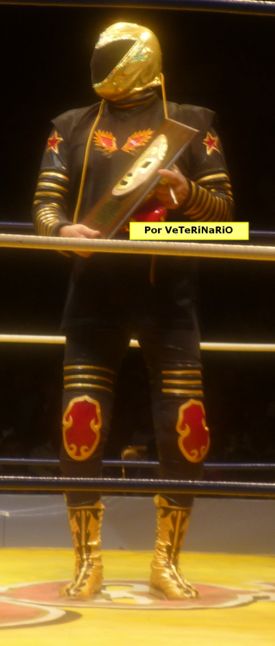 |
|
||||||||||||||||||||||||||||
Biography
inieblas was born on June 8, 1939 (not 1945 like he'll tell you) in Mexico City. Even though his family name shouldn't be revealed at this point, he's the brother of a famous Mexican bullfighter of the past.
From the 60s to the early 90s, there was a very popular magazine in Mexico called "Lucha Libre", run by Valente Pérez (though it was renamed "Lucha Libre Mundial" when Benjamín Mora Jr. took over, and not coincidentially, the magazine didn't last a lot with Mora in charge). LL also had a bodybuilding sister magazine called "Muscle Power", whose editor also was Valente Pérez. Pérez, who was well liked and respected in the business and had a very good relationship with the Lutteroth family, had a special talent to come up with names and personalities for new luchadores, the most successful one being Mil Máscaras.
At the same time, a young man who had entered "Mister Jalisco" contests in Guadalajara, was scouted by Black Shadow and Dory Dixon. Both saw a future star in the youngster, especially because he was very tall for a Mexican. Shadow and Dixon convinced him to get into pro wrestling and he went under training with EMLL's maestros Rafael Salamanca and Dick Medrano.
Before wrestler, he was an actor and extra, participating in films with capulina, Santo and Blue Demon in movies such as Frankenstein, Satanas and was one of the mummy's in Las Momias de Guanajuato. He made his debut as Tinieblas in the movie Los Campeones Justicieros (1970. A year later made his debut as luchador. He also participated in these films:
- 1982 El puño de la muerte as Tinieblas
- 1982 La furia de los karatecas as Tinieblas.
- 1975 El investigador Capulina as Tinieblas.
- 1975 Las momias de San Ángel (as Tinieblas 'El Gigante') .
- 1974 Macabre Legends of the Colony (as Tinieblas el Gigante) .
- 1973 The Castle of Mummies of Guanajuato(as Tinieblas El Gigante) .
- 1973 Una rosa sobre el ring (uncredited) .
- 1972 Kalimán el hombre increible (as the egypcian Mummy)
- 1971 The Champions of Justice(as Tinieblas el Gigante) .
- 1971 Superzan el invencible .
- 1970 Las momias de Guanajuato (as Satán)
- 1969 Modisto de señoras (uncredited) .
- 1969 Santo y Blue Demon contra los monstruos (as Franquestain) .
- 1963 Kings of the Sun (uncredited) .
Also, he filmed Las Aventuras de Capulina with Alushe in the 70s and 80s.
In 1968, Pérez came up with a new character that had money written all over it. He thought about an ultimate heel nemesis for Mil Mascaras, and what better for that than the subject of darkness? He had even designed the perfect mask for this wrestler - a faceless hood. That's how Tinieblas was born, but in the end, he made his debut (and spent the rest of his career) as a tecnico and not as a rudo. In his first match, he teamed with Dory Dixon and Black Shadow to face Dr. Wagner, El Solitario and Renato Torres in the main event of the August 20, 1971 Arena Mexico card.
In a way, Tinieblas can be seen as a disappointment, because even though he has had a very respectful career and nobody can deny that he is a legend, it was thought that through the movies he'd eventually reach the legendary status of El Santo and Blue Demon just like Mil Mascaras did.
He made a few movies (he had actually been a stunt man and an "extra" in many films before his lucha debut, with perhaps his most relevant work being in the Tarzan TV series of the 60s), and he was often used as a villain due to his size (he was Dr. Frankenstein in the 1973 "Santo y Blue Demon contra el Dr. Frankenstein") but he never really became a successful movie star. However he became a pioneer of an alternative art form that is still strong today - the weekly comic books. At their peak of popularity, those small books released issues on several stars, but he was the first one, other than Santo, to get his own weekly comic. He had a series released from 1976 to 1979, which is considered the best and most successful one. In the early 90s (1991 and 1992 to be more concrete) there was a "lucha magazine boom", as more than 20 WEEKLY publications were released in the country. But the one that easily was the largest selling magazine of them all, was the little comic booklet called "Sensacional de Luchas a Color". This book, published by Editorial Ejea, featured an history with a masked wrestler every week. While Rayo de Jalisco Jr., Misterioso, Atlantis, Octagon and others were heavily featured on those, the only wrestler that had his own comic was Tinieblas. This series called "Tinieblas, El Hijo de la Noche" (Son of the night) lasted from 1991 to 1995 (when the boom was long dead, economy went down and production costs went up). The comic was relaunched in the year 2000 by Editorial Shilbalba, but now it had a bigger page format and far better production (so not to look cheap and outdated compared to the Japanese and American comics). At this point, he's the last wrestler to have the honor of having his own comic book. In Japan, Tinieblas is described as a "Modern Comic Hero"
The lack of titles and big singles main events during his career tells us that Tinieblas' biggest strength wasn't his ringwork. It was adequate, though, but as he had a very late debut, age caught him faster than it does with other luchadores.
Either way, Tinieblas was a big draw and achieved huge success as a "lucha embassador" in countries like Panama, Guatemala and many of the Caribbean islands. He also was one of the first luchadores to tour Japan when he came for an August of 1974 tour as "El León Tinieblas", but he didn't return to Japan until 1991, when he was used by the W*ING promotion in a tag team with his son, Tinieblas Jr.
As mentioned before, there's a general lack of big trophies in Tinieblas' career. In March of 1980, he won the Junior Heavyweight Title in Jose Azzari's Guatemalan UWA, defeating La Furia and losing it back in Guatemala to Edgar Echeverría after 15 successful defenses. He also briefly held the WWA World Heavyweight Title (defeating Bill Anderson on January 31, 1987 in Los Angeles) until losing it to Super Halcón, but that's about it, as he has never been in a big "lucha de apuestas".
He also was one of the very first men that left EMLL in December of 1974 to form the UWA. Since then, he has spent the rest of his career as an independent contractor. He had long runs in Tijuana with Mora but he was loyal to the UWA until it was in its last legs. In June of 1992 he jumped to AAA. Other than some work for EMLL in 1996, he stayed with AAA until he and his son left in August of 1997. The junior jumped to Promo Azteca and the senior became a true freelancer again (though he now had ties with Promo Azteca). Today, he can often be seen competing for EMLL and the IWRG.
Tinieblas' popularity is still high today among kids. In order to keep his name strong, in 1988 he added his "mini-mascot" Alushe to his act, and in the late 80s and early 90s he appeared in the Capulina TV show for kids. Nowadays he follows the Mil Mascaras routine of wrestling everywhere, but just a few dates to avoid burning out.
It's not known how long will Tinieblas stay in the business. He has little athleticism left but he has shown no signs of retirement and it looks like he will be able to get work at almost all the big arenas for a few more years, relying on name value and Alushe's comedy.
As a fun fact, one of Tinieblas' nicknames is "El Gigante Sabio" (The Wise Giant). In the Lucha Libre magazine, and more recently in Luchas 2000, there was a "Pregúntale a Tinieblas" (Ask Tinieblas) section where people would supposedly send him general culture questions and he'd answer them. After reading Tinieblas' answers and seeing how accurate they are, you can bet that an encyclopedia was used to answer those, but in reality, Tinieblas is a very intelligent man with a tremendous cultural knowledge!
During 2010 he made a retirement tour in AAA CMLL and independients arenas. Later he changed his mind and continued wrestling. He said in an interview by El Hijo del Santo's program that he might retire in 2012 or 2013. After 45 years wrestler, he finally retired. He says won about 10 masks and 15 hairs matches.
not Dr. Alfonso Morales
On the week Tinieblas debuted, lucha announcer Dr. Alfonso Morales was absent. Dr. Morales missing a show is a strange event, he's a tall man, and Tinieblas is a tall man, so some believed the announcer was actually under the mask.
This is not true. Morales is not Tinieblas, and has done commentary on his matches. Still, the rumor persists and is running joke among the announcers.
Luchas de apuestas record
| Date | Apuesta | Winner(s) | Loser(s) | Arena and/or Place |
|---|---|---|---|---|
| ??/??/?? | Mask | Tinieblas | Fuerza War | ?? |
| 70's/??/?? | Mask | Tinieblas | Atila (local wrester) | ?? - , Guatemala, Guatemala |
| ??/??/?? | Mask | Tinieblas | Simio | ? Guatemala? |
| 70's | masks | Superzan & Tinieblas | Los Tigres del Ring | Cd Victoria, Tamaulipas |
| 73/07/24 | hair | Tinieblas | TNT | Palacio de los Deportes |
| 74/12/08 | hair | Tinieblas | El Delfin | Orizaba |
| 75/07/03 | mask | Tinieblas | Asesino Negro | Auditorio Municipal Cd Victoria, Tamaulipas |
| 1978 | mask | Tinieblas | Bulldozer | ?? |
| 82/04/24 | mask | Tinieblas | Red Terror | unknown |
| 83/11/13 | hair | Tinieblas | Super Máquina | Palacio de los Deportes - Mexico City |
| 1984 | mask (1) | Tinieblas, Villano III & Rocky Star | Flama Roja, El Legionario (original) & Superzan | Ciudad Juarez |
| 1986/10/18 | hair | Tinieblas | Bill Anderson | Olimpic Auditorium, Los Angeles, California |
| 87/??/?? | hair | Tinieblas | Abdullah Tamba | L.A. Olympic Auditorium - Los Angeles, CA, USA |
| 80's | mask | Tinieblas | El Internacional | unknown |
| 92/07/19 | mask | Tinieblas | Ice Man | Gimnasio Municipal - Cd. Juarez, Chih, Mexico |
| 99/04/04 | mask (2) | Tinieblas & Alushe | Médico Asesino Jr. & Enfermerito | Auditorio Municipal Torreón |
| 01/01/21 | mask (3) | Tinieblas | El Enfermero 2001 | Gimnasio José Neri Santos - Cd. Juarez, Chih. |
| 03/01/24 | mask (4) | Tinieblas | Zombie II | Campo Antonio Palacios - Ensenada, B.C. |
| (1) Relevos australianos suicidas, in this match Superzan loss the mask, but it is not known who's the winner of the mask of Superzan and if it was the original Alfonso Mora or an imposter, (2) Medico Asesino walked off without unmasking; mascots masks were on the line as well. (3) Relevos Suicidas vs. Máscara Sagrada & Fishman Jr.; (4) 12 wrestler ruleta | ||||
Gallery
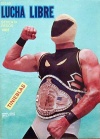 as (Guatemala) World Junior Heavyweight Champ |
 with Blue Demon |
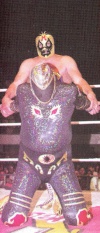 vs. Mil Mascaras |
